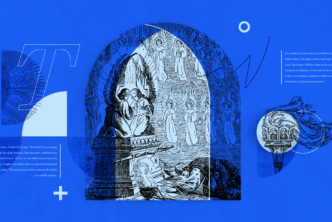by Luke Nagy
We’ve all heard the saying, “this world is not my home; I’m just a passing thro’.” The words are from a hymn penned in 1919, and arranged in 1937. It reflects a popular attitude among Christians in America at the time, and currently. A world ravaged by the Great War and the Spanish Flu looked pretty dismal. This notion, that the present world is not the Christian’s home, seemed to be very comforting at the time, and it’s holding sway in our current economic and political climate. Pew Research in 2015 found that 72% of Americans believe in Heaven, which was defined as “where people who have led good lives are eternally rewarded.”1 Thus it is fair to say that “This world is not my home” is the predominant view.
But this is not John’s view, and it is not the view of the writers of the New Testament or of the Old. The promise of both Testaments is the resurrection of the dead, to live on earth in a righteous, eternal, kingdom – one ruled by God Himself. This is such a crucial notion that the Nicene Creed says that “I look for the resurrection of the dead, and the life of the world to come, Amen.”2 Even a cursory reading of Revelation 19–21 reveals an earth-based Millennium and Eternity. But this is consistent with eschatological hopes and promises in the OT, as well.
The greatest promise of the Old Testament receives its fulfillment in Revelation. God promises that He will be the Israelites’ God and they will be His people:3
“Behold! The tent of God is with men, and He will tent with them, and they will be His people, and He is God with them to be their God” (my translation).
“ἰδοὺ ἡ σκηνὴ τοῦ θεοῦ μετὰ τῶν ἀνθρώπων, καὶ σκηνώσει μετʼ αὐτῶν, καὶ αὐτοὶ λαοὶ αὐτοῦ ἔσονται, καὶ αὐτὸς ὁθεὸς μετʼ αὐτῶν ἔσται [αὐτῶν θεός]” (NA28).
This “tenting” happens on earth. Not in Heaven. The New Jerusalem is clearly described as “coming down.” Moreover, the Old Testament prophecies of God being the God of His people who dwells with them, is in the context, particularly in Isaiah, of a Messianic Temple in Jerusalem, with detailed architectural plans and a topographical tribal division of Canaan which will indubitably take place during the Messianic Kingdom. It is the uniform teaching of both Testaments that the Messianic Kingdom takes place in Jerusalem and affects Israel and her geographical neighbors, with clear borders. One cannot dismiss this as merely symbolic without doing violence to the integrity of the text, vouchsafed by the univocal nature of what has been revealed. Thus it is reasonable to say that at least 72% of Americans are wrong when they think of heaven as the place where people spend eternity.4
What I’d like to consider next is how careful the Holy Spirit and the biblical authors are with their descriptions to ensure that we will not be confused about the final destination of the righteous, even down to the nuances of word-choice.
As I’m sure you noticed, I’ve chose to translate the verb σκηνόω very literally. The nominal root σκηνή/ σκῆνος meaning “tent.” BDAG says of σκῆνος that it is a temporary abode as opposed to a permanent structure. Σκηνή similarly means a “tent” or “hut.” And we can see throughout the biblical uses of this word family that the idea is of non-permanent structures. Related words (σκηνοπηγία; σκηνοποιός; σκήνωμα; ἐπισκηνόω; and κατασκηνόω) carry the sense of impermanence. TDNT states about σκηνή: “the basic history of the word shows that from the very first and consistently ‘tent’ is the basic sense from which all others derive.”5
The idea of “pitching a tent” is found throughout the Bible. But, as above, John is using this passage in a theologically significant way, contrasting it with κατοικέω – a verb John only uses in Revelation, though in Revelation he uses it frequently.6 Not only is the verb κατοικέω used often, but apart from one usage referring to Satan, all the referents point to the “dwellers,” those on earth who are tested during the Tribulation.
The routine expression is “κατοικοῦντας ἐπὶ τῆς γῆς” (“the dwellers on the earth”). Thus, it would seem that the simple explanation of John’s theological vocabulary in Revelation is that κατοικέω is used for unbelievers and σκηνόω for believers. But why “dwellers upon the earth” and not “dwellers in the world”? This is a puzzling and radical shift in word usage. In John’s Gospel, John uses κόσμος “world” 78 times and γῆ “earth” 13 times. This gives us an exactly 6:1 preference for κόσμος over γῆ in John. But He uses γῆ 82 times in Revelation compared to only 3 uses of κόσμος – a ratio of 27:1!
Why the reversal? The “world” as a theological term representing fallen humanity in rebellion to God is certainly crucial to Revelation. John isn’t afraid to use “κόσμος.” In fact, in the central passage of Revelation, John says that the kingdom of this world has become the kingdom of our God.7 So why does John not describe those living in the world (γῆ) during the tribulation as “dwellers in the world (κόσμος)”? Because the emphasis is not primarily about whether those who dwell on this planet are dwelling on the earth or in the world-system.8 Rather, the distinction is in the verbal description as either “dwelling” or “tenting.” It’s not where you live: “in Heaven”; “on the earth”; “in the world”. John’s emphasis is the mode of habitation, wherever you live – is your dwelling permanent or temporary?
What then does John’s word use tell us about his theology of habitation in Revelation? We see that John consistently describes believers in Heaven as “tenting” there. We see that Revelation consistently presents God as “tenting” wherever he dwells – over believers, in heaven, on earth – that God is never truly “at home” anywhere (at least not “at home” in the sense that that place is where He is from and that can lay some kind of claim on Him as being his patria).9 Moreover, those on earth are “dwellers” who κατοικέω on earth, which is a deliberate verbal contrast from those who σκηνόω in Heaven. This, additionally, cannot simply be a distinction between believers and unbelievers, as there are multitudes who are martyred for Christ, as well as the 144,000 who are sealed believers also are “dwelling” on the earth.
Lastly, the clear and deliberate restraint from using κόσμος to refer to the planet suggests that John is being very careful to differentiate κόσμος as the empire of Satan, from γῆ which is the creation of God and the proper dwelling of humanity.
The “dwellers on earth” are differentiated from the “tenters in Heaven” not because of any topological quality of Heaven versus earth or because of the spiritual condition of those on earth and those in Heaven. Rather, the tenters are tenting because they are waiting for the kingdom of the world to become the Kingdom of God so they can return to their proper οἰκία.
But why this? Why is John so consistent on such an apparently small issue of word choice? Because John believes that the world, in the sense of the planet earth, is the proper and eternal abode of believers. Whatever the rapture is and whoever happens to be in Heaven during the Tribulation, there are people in Heaven during the Tribulation and they are not in Heaven as permanent residents. They are there awaiting the Parousia and the Kingdom of God in the Millennium and the Eternal State when the New Jerusalem descends from Heaven and the “tent” of God is with man and He will be our God and we will be His people.
This is crucial to New Testament theology, though it seems to be missed by many Christians. Yet this oversight has consequences. It means that Christians do not comprehend our inextricable ties to the earth as our home.
Above I mentioned that God has no patria that has any claims on Him. I used those words advisedly, because our homeland does, indeed, have legitimate claims on us. Our homeland has a claim to our allegiance, to our love, to our care, to our defense, to our labor in making it Eden. It has that claim if for no other reason that that we are made of it. We are, indeed, made of our homeland – we’re dust and to dust we’ll return. We are treasure in earthen vessels. That treasure is not, according to substance dualism or Trichotomism (our souls or spirits), but rather the indwelling Holy Spirit. But we are earthen vessels. And earth comes from the earth and from specific places on the earth. Clay is not ephemeral – it is closely linked to place. God affirms this through John.
And naturally, this has an anthropological connotation. In combination with substance dualism and Trichotomism, the belief that we will spend Eternity in Heaven, and that Heaven is our true home reinforces the subtle Gnosticism that has infected contemporary Christianity, via (if nothing else…and there is else) the denigration of the body and the physical, an overemphasis on the noetic, and an undefined “spirituality.” Moreover, this also contributes to the “abandonment theology” that has infected and affected so much of conservative Evangelicalism.
The truth is that the world is our home. From Genesis to Revelation the hope of believers is a bodily resurrection on this earth. Abraham, the father of the faithful, was a sojourner in the world, looking for a new city whose foundations and whose builder and architect is God. Heaven is not that city! He longed not for some disembodied celestial existence. His desire was for a place on earth where God is in charge. John points out the fulfillment of Abraham’s desire for a greater abode than Ur of the Chaldees: God’s City; the City of the King; The New Jerusalem.
The world is our home. We may just be a passin’ through, but if we’re in Christ, we’ll be a passin’ right back in someday.
Luke Nagy is a pastor currently completing a Master of Theology Degree at Dallas Theological Seminary, working on a Thesis which integrates Theology, Psychology, and Neurology to understand Impulsive Behavior and Human Free Will.
- https://www.pewresearch.org/fact-tank/2015/11/10/most-americans-believe-in-heaven-and-hell/.
- The Greek behind this is “καὶ ζωὴν τοῦ μέλλοντος αἰῶνος”. It could be argued that αἰῶνος refers to an epoch of time only and not the place where that epoch is lived out. Admittedly, that’s possible, but its juxtaposition to resurrection makes it appear that the Creed is using αἰῶνος not merely temporally, but in the sense of it being “the world”. A similar expression is used in Mark 10:30 and Luke 18:30, where the blessings of leaving family and property is rewarded in the “age to come”. Naturally, this could happen in Heaven, but the idea of having houses and fields sounds rather more earthy to me.
- These are the significant passages that deal with this expression: Genesis 17:8; Exodus 29:45; Jeremiah 24:7; Jeremiah 31:33; Jeremiah 32:38; Ezekiel 11:20; Ezekiel 14:11; Ezekiel 37:27; Zechariah 8:8; 2 Corinthians 6:16; Hebrews 8:10.
- I grant that many people often give their best answers if the framing of the question doesn’t fit exactly with their beliefs and so the percentage may differ, but my experience in discussing theology with non-theologians (and theologians!) would suggest that it’s reliable.
- TDNT, σκηνή, 368.
- Revelation 2:13; 3:10; 6:10; 8:13; 11:10; 13:8; 13:12; 13:14; 17:2; 17:8
- The 2 other places where John uses κόσμος in Revelation are 13:8, 18:8; both use a fixed phrase “ἀπὸ καταβολῆς κόσμου”.
- Recently in a Bible Study one of my parishioners pointed out that much of God’s action in Revelation, especially in the Trumpets, is directed at the earth and not at the people. This spurred on a very enlightening conversation – the key point of which is this: The world-system, is a system that uses God’s creation in rebellion against Him. God strikes (or plagues) creation to punish those who use it to rebel against Him! John’s description is in keeping with his love of dramatic irony.
- Only 3 verses in Revelation have the lemmata σκηνόω and θεός: 7:15; 13:6; and 21:3. The most difficult to exegete is 13:6 where Antichrist blasphemes “καὶ τὴν σκηνὴν αὐτοῦ” and “τοὺς ἐν τῷ οὐρανῷ σκηνοῦντας”. Here the difficulty lies in understanding whether the “σκηνή” is God’s “dwelling” or whether it refers to the tabernacle as the heavenly temple, or if it refers to the dwelling that God has created for those who dwell there. Theologically, however, if God “pitches His tent” on earth with man, then there is no reason to think that He doesn’t also “pitch His tent” in Heaven – as Heaven as just as contingent as the earth.





